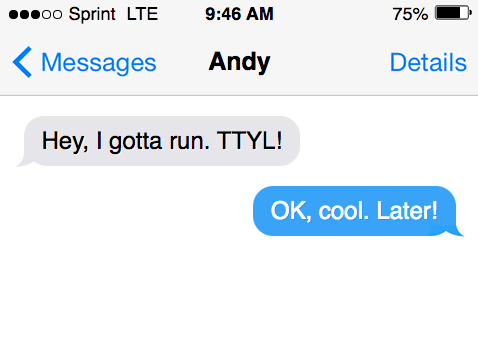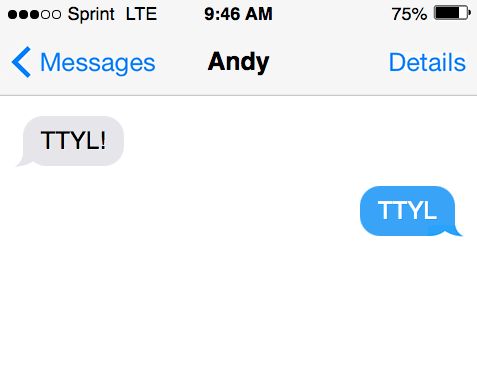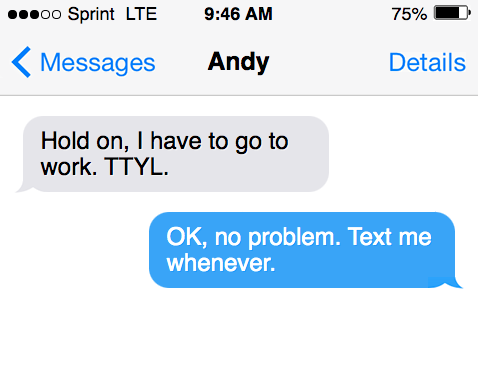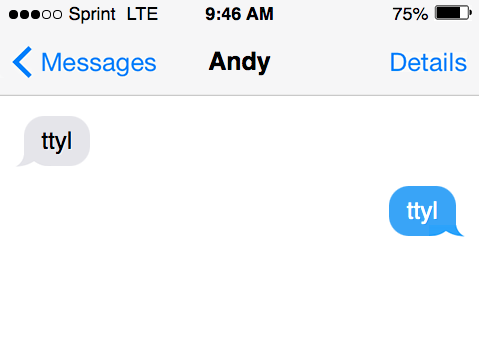What does “TTYL” mean over text conversations? When someone uses the acronym “TTYL,” it can be confusing. What does it mean? Does it mean, “To Talk You Later?” Does it mean something inappropriate? Should it get used in formal or informal settings? The English language is changing, thanks to the internet.
Learn what “TTYL” means in this short guide…
“TTYL” meaning and definition
“TTYL” simply means, “Talk To You Later.” It is a way of saying goodbye over instant messaging, IRC, Snapchat, direct message, or text messages. The use of the abbreviation is to inform the other party that if they decide to text, there could be a delay in a response.
Similar uses of abbreviations include “G2G,” (Got to Go) “AFK,” (Away from Keyboard) or “BBL” (Be Back Later). All of which inform someone that they will be away from their digital communication device.
It’s commonly used to prevent aggravation to someone who believes the conversation is still active. The use of the abbreviation is to inform and manage expectations.

Capitalization
Most commonly, “TTYL” is used in either ALL CAPS or all lowercase.
Correct: TTYL
Correct: ttyl
Incorrect: tt y l
Incorrect: ttyL
Punctuation
Most commonly, “TTYL” ends with either an exclamation point, a period, or nothing at all. With the last keystroke being the “L” in the acronym.
Formality
Typically, “TTYL” is used in informal discussions. “BRB,” a similar short form, could get used in business settings like on Microsoft Teams or Slack.
Correct: Texting a friend.
Incorrect: Messaging your manager.
Common places “TTYL” gets used
“TTYL” is commonly used on the following platforms:
- Social media: Snapchat, Instagram, Facebook, or Twitter.
- Texting: Conversations over SMS and text message.
- Chat rooms: Discord, IRC, and other online forums.

History of “TTYL”
Urban Dictionary dates “TTYL” back to the early days of the internet (prior to 2003). It stands next to abbreviations like “OMG,” and “LOL.” As well as many other internet slang terms that became popular thanks to AOL Instant Messenger.
This term was popularized in internet chat forums and later through SMS or text messaging protocols. Widespread usage of the term began to drop once internet chat rooms and protocols became less popular. Although, it is gaining in popularity once more thanks to Discord chatting.
“TTYL” has no other meanings other than “Talk To You Later.” The only other variation that could get used would be, “ta ta, you all.” Though, this is a far less common usage of the acronym.
Examples of “TTYL” getting used
Here are examples of “TTYL” getting used in a conversation between two people.
Example one
Friend 1: “I’m about to go the gym and then when I get back, I’ll message you. TTYL!”
Friend 2: “Okay, no problem. Talk to you in a little bit.”
This example shows one friend alerting the other person that they will be away from their keyboard, phone, or other device. It is informing the person that if they decide to message them, they won’t get to respond right away.

Example two
Friend 1: “TTYL!”
Friend 2: “Alright, talk to you later.”
The second example shows a person using “TTYL” to randomly inform someone that they are leaving. An exclamation point could get used to end the “TTYL” acronym.
Similar short forms and abbreviations
Similar acronyms that could get used online or when texting:
BRB: Or, “Be Right Back.” Another way to inform either one or many people that someone is stepping away from their device and won’t be able to talk.
BBL: Meaning, “Be Back Later.” A similar phrase as “BRB.” It allows a person to communicate that they will be stepping away from their device.
G2G: Standing for “Got to Go.” This is when someone needs to get away from the computer or device very quickly.
AFK: “Away from Keyboard.” A variation of all of the above abbreviations that lets someone know that they are leaving the area where they can type on the keyboard and communicate.
SYL: Standing for “See You Later.” This is another way for someone to say goodbye. More commonly, “TTYL” will get used as it’s been part of internet slang for a very long time (with higher adoption).

Common FAQs
Questions from English speakers.
If a girl says, “TTYL,” does it mean she doesn’t like me?
It’s difficult to put “TTYL” into context. If a conversation is active and the person randomly decides to say, “TTYL.” Then it could mean that they are no longer interested in continuing the conversation.
Context is critical. If the two of you were talking for a long time and the girl says, “TTYL.” It could mean that she simply needs to go. Remember, “TTYL” stands for “Talk To You Later.” It does not mean they would like to say goodbye forever.
Is “TTYL” still used?
Yes. “TTYL” can get used over text messaging conversations. It is a way of informing one person that they won’t be responsive for a period of time.
| Type | Initialism |
| Meaning | Talk to you later |
| Intention | To inform, notify |
| Origin date | Prior to 2003 |
Sources
- TTYL (abbreviation) definition and synonyms
- ttyl – Urban Dictionary
- Ttyl Definition & Meaning – Dictionary.com
- What Does “TTYL” Mean, and How Do You Use It?
- What Does ‘ttyl’ Mean? – Merriam-Webster
- TTYL – Wiktionary
- Ttyl Definition & Meaning – Dictionary.com
Inside this article
Fact checked:
Content is rigorously reviewed by a team of qualified and experienced fact checkers. Fact checkers review articles for factual accuracy, relevance, and timeliness. Learn more.
Core lessons
Glossary
- Abstract Noun
- Accusative Case
- Anecdote
- Antonym
- Active Sentence
- Adverb
- Adjective
- Allegory
- Alliteration
- Adjective Clause
- Adjective Phrase
- Ampersand
- Anastrophe
- Adverbial Clause
- Appositive Phrase
- Clause
- Compound Adjective
- Complex Sentence
- Compound Words
- Compound Predicate
- Common Noun
- Comparative Adjective
- Comparative and Superlative
- Compound Noun
- Compound Subject
- Compound Sentence
- Copular Verb
- Collective Noun
- Colloquialism
- Conciseness
- Consonance
- Conditional
- Concrete Noun
- Conjunction
- Conjugation
- Conditional Sentence
- Comma Splice
- Correlative Conjunction
- Coordinating Conjunction
- Coordinate Adjective
- Cumulative Adjective
- Dative Case
- Determiner
- Declarative Sentence
- Declarative Statement
- Direct Object Pronoun
- Direct Object
- Diction
- Diphthong
- Dangling Modifier
- Demonstrative Pronoun
- Demonstrative Adjective
- Direct Characterization
- Definite Article
- Doublespeak
- False Dilemma Fallacy
- Future Perfect Progressive
- Future Simple
- Future Perfect Continuous
- Future Perfect
- First Conditional
- Irregular Adjective
- Irregular Verb
- Imperative Sentence
- Indefinite Article
- Intransitive Verb
- Introductory Phrase
- Indefinite Pronoun
- Indirect Characterization
- Interrogative Sentence
- Intensive Pronoun
- Inanimate Object
- Indefinite Tense
- Infinitive Phrase
- Interjection
- Intensifier
- Infinitive
- Indicative Mood
- Participle
- Parallelism
- Prepositional Phrase
- Past Simple Tense
- Past Continuous Tense
- Past Perfect Tense
- Past Progressive Tense
- Present Simple Tense
- Present Perfect Tense
- Personal Pronoun
- Personification
- Persuasive Writing
- Parallel Structure
- Phrasal Verb
- Predicate Adjective
- Predicate Nominative
- Phonetic Language
- Plural Noun
- Punctuation
- Punctuation Marks
- Preposition
- Preposition of Place
- Parts of Speech
- Possessive Adjective
- Possessive Determiner
- Possessive Case
- Possessive Noun
- Proper Adjective
- Proper Noun
- Present Participle
- Prefix
- Predicate



